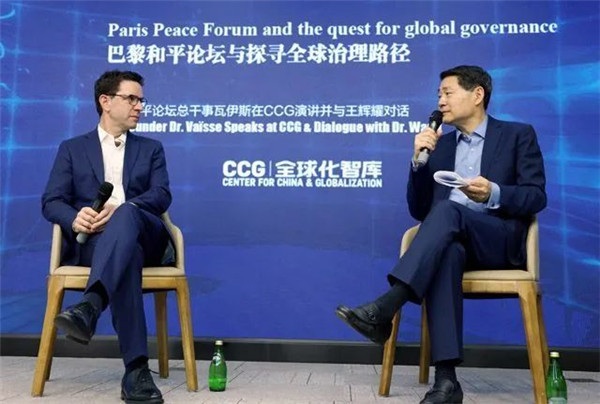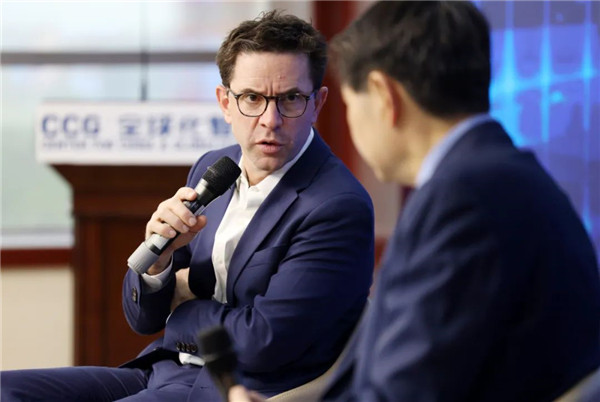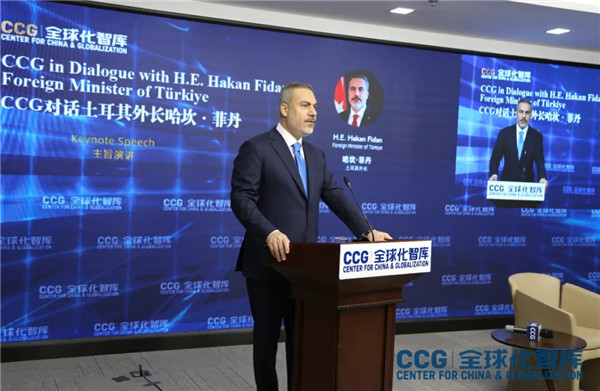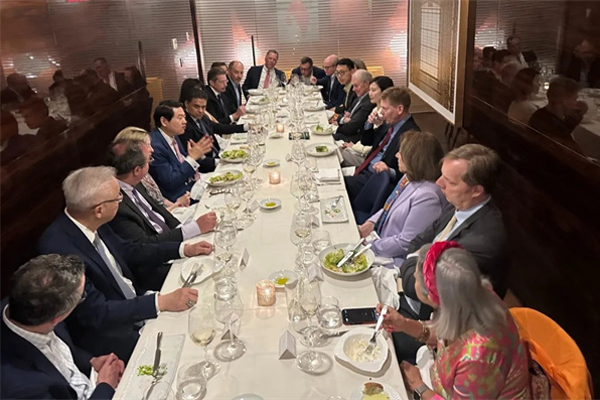Text:Wang Huiyao in Dialogue with Justin Vaïsse
French President Emmanuel Macron visited China from April 5th to 7th, 2023. On April 4th, Justin Vaïsse, founder and Director-General of Paris Peace Forum, gave a speech at the Center for China and Globalization (CCG) and engaged in dialogue with CCG President Wang Huiyao as he accompanied President Macron’s visit to China. During the discussion, they shared insights on new paths and opportunities for the development of China-EU relations, multilateralism, and reforms in global governance.
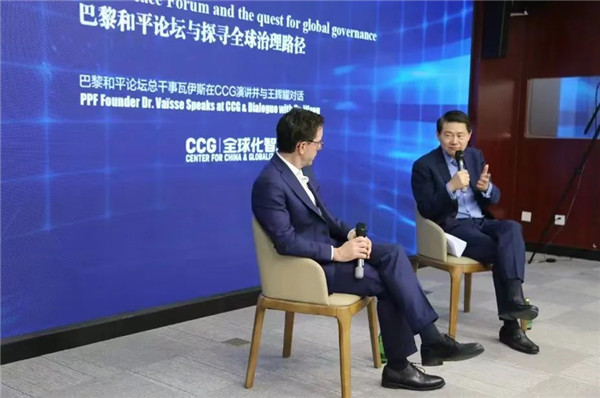
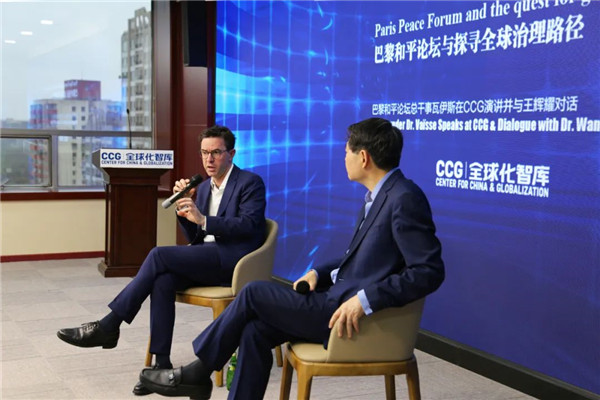
Justin Vaïsse: That would be pretty much my first remark, which is that this trip by Macron and Von der Leyen really is the first large visit after Covid. And I think that’s really important, because direct contact, direct conversation between Europe and China, between France and China in particular, really is important. To that, I would add the importance of people to people contact. So you’ve been a pioneer in that, after Covid, towards the end of the year, Covid period. But I think it’s really important that in order to do what I was calling for earlier, that is taming competition and making sure that they’re still understanding. I do believe in people to people contact. They won’t solve everything. They’ve never stopped wars from being fought, but they help. And so I think that’s really important. The first time I visited China was a long time ago, like a quarter of century ago, in the late 1990s, and I remember taking the train and buses, etc. as a backpacker, as a tourist. And I think that’s an experience that people should be able to keep doing. One of the problems now that I just realized, and maybe CCG can do something about it, is it’s very difficult to pay now in China, when you’re a foreigner, they used to just use cash or credit cards, but of course, now pretty much all payment forms are through your smartphone and Alipay etc. And one of my worries is that it would restrict the sort of free circulation of foreigners, or young students visiting China, like myself 25 years ago. So that’s a point of attention. I really think it’s important. So my second point is really people to people contact. And then I think thirdly, that it’s really important to have that sort of triangular discussion. I really believe the face to face with the US is not sound, is not good. I know the US pretty well. I’m a historian of US foreign policy. And there is a tendency in Washington to have strong swings of mood, and right now the mood is pretty much anti-China, and it’s pretty much fight partisan, and that’s one of the few things that Republicans and Democrats can agree on now. So they’re very grateful for China, because at least there’s a dose of bipartisanship on that issue. But joke aside, and it’s not really a good matter joke about, but joke aside, I think we should be very careful at this moment that things have been sort of degrading. Recently we keep this conversation open. And I think Europe, by having a frank conversation with China, but also with the US, can help in this regard. And last point, probably the fourth and last point, would be that it’s important to talk about the things we disagree on. That’s part of the competition, cooperation and mix. And I hope the trip can see progress on how we converge on the issue of the Ukraine war, or actually the Russia’s war on Ukraine, to be more precise. And that’s an important issue, which is of course, at the top of the diplomatic agenda, and I think there needs to be convergence. And there are many reasons to think that we can reach a higher level of convergence.
Wang Huiyao: Great. Thank you, Justin that you actually mentioned is cashless society. China is becoming so quickly. We just had the president of a national committee on US and China Relations came, he complained the same(thing) today. So that’s a good point, but again, I think your, this trilateral point is really good. I think EU now is playing an enormous role, and I actually even mentioned some time ago, I think we should have this G3 to talk, and French and EU play such an important role in terms of mitigated relations, tensions between US and China, for example. So I think that that is really important. And now that we have this Russian Ukraine conflict, and I remember last time when Chancellor Scholz come, they had come and understood that China and Germany said, no nuclear war should be fought. So that’s a very strong message. And so I hope that this time, President Macron and President Von der Leyen, maybe we can have more mutual understanding of each other’s position, and then so that we can have a better dialogue to promote peace, because China has proposed a peace proposal, so that we can further improve that with our European leaders. Now, This time I also noticed Macron has brought a very large business delegation. There’s about 60 business people travel with him. And he is not going to be just in Beijing. He’s also traveling to Guangzhou. Last time in 2019, he went to Shanghai Import Expo. That was the Changjiang River Delta. Now he goes to the Pearl River Delta, Great Bay Area. So you see the economic cooperation also now it’s getting between China and and France company and EU company, so there could be more potential there. So Airbus and many companies from EU are in Beijing. So what do you think about the business, economic ties?
Justin Vaïsse: So I think two points probably. One is that it’s definitely very important, not just for the prosperity of both parties, etc. But also for the people to people exchange that it creates that business is the probably, in terms of volumes, the first motive for people to people exchanges. And so I think it should be encouraged, and we should work on having as much as possible rules on both sides that are predictable and good. This said, we shouldn’t be under delusion that it’s sufficient. I think it helps. It’s really important to promote it, but it’s not enough. And there need to be a political and geopolitical discussion at the highest level that makes sure that we cooperate, we have many examples of countries trading massively among one another and still going to war with one another. My continent, Europe, offers several examples, including just before World WarⅠ, exchanges between Germany and the UK, for example, Germany and France, for that matter really were important. And so it’s not enough. Trade, by itself, doesn’t produce peace, but it helps. And so I think these should be sustained and made predictable and more beneficial tool.
Wang Huiyao: You mentioned about this global governance, I mean, the deficit, the gap. We have the global governance falling behind global practice. So Paris Peace Forum is actually making a lot of difference. You talked about the space governance. I went to your event in last November. It’s very impressive. Those ten dinners and each dinners of 10 people in one evening were great success, I was actually with the ten people dinner table from the space industry, astronauts and experts talking about how space governance can work out. There’s a lot of debris in the space for example and how we can have that governance? So for the Paris Peace Forum, and very unique, and you got this vertical globalization going on and so what’s your vision? And the Paris Peace Forum, when you found it, but now how to reach the next level? And also pushing the global governance for better. Many things that maybe UN and other organizations are not able to achieve. The Paris Peace Forum is really doing great jobs on that. So how do you see the Paris Peace Forum and we can collaborate in the future?
Justin Vaïsse: Absolutely. I think that’s a really important domain. It may seem a bit far away for many of the listeners and people in the room, but I think it’s very present. So we depend heavily on satellites for our communications, for our localization, for our earth observation, for weather forecast, for pretty much all of the things that we do, we heavily depend on space. And so we need to make sure that we have rules in place that we’ll ensure that we can enjoy it in the future, especially because countries from the Global South are also demanding that we don’t pollute or spoil the place before they are able to enjoy these benefits. There are only about 8 to 12 real spacefaring nations, no more. And so some of them are doing pretty well. I mean, the UAE, for example, the United Arab Emirates have been doing many processing in space. So it’s democratizing, if you’d like. But still, for example, if we have too many debris and constellations in the low earth orbit, there won’t be space for them. That’s one thing. And that’s why we push this initiative at the Paris Peace Forum. But more generally, I think we should think beyond this. And especially because now the moon is back in fashion, and we’ll have US astronauts, and then probably Chinese astronauts going there, we should start thinking about the rules that we give ourselves in balancing competition with cooperation here again, to make sure that we are able to cooperate. In two worlds, to operate, not necessarily jointly, but at least we are in good understanding on the moon, in terms of places where a basis will be put that will agree on a number of norms. So, for example, one of the funny questions is what time is it on the moon, right? So will we have American time? No, no. But it’s a serious question, because then you need to make sure that you can coordinate with other nations that will want to have, in 2030, 2035, 2040, that will want to have a base on the moon. And so they’ll need to agree on a few basic things. And for all of these things, I think it calls for renewed cooperation, and we should be very careful and not think that it’s science fiction. I’m a big fan of Liu Cixin and The Three Body Problem. And I don’t know if I pronounce that correctly. In French, we say LIU Zixin, but I know you don’t pronounce it this way. Liu Cixin, if I’m not wrong. And so he asked very good questions about global governance in the trilogy of the Problem of the Three Body, which is, what do we do vis-à-vis an external threat? And how are humans able to cooperate jointly to answer challenges that are opposed to all of them, not just to China, not just to the US, not just to Europe, but to all of them? In this case, as you know, for those who have read the book, the risk of an invasion 200 years from now, because it takes time to go from the place where these extraterrestrial people are to the Earth. And I think these are very good questions, and they’re very concrete in terms of how we’ll be using celestial bodies in the coming years. So that calls for more cooperation, and I’m glad that Paris Peace Forum will be doing more on that.
Wang Huiyao: Great, good question. What time is it now on the moon? But so I’ll finish last question, open to our scholars and audience. I know that you mentioned actually this Biodiversity Forum which Kunming and Montreal just achieved a lot of good things actually. It shows we can work together. But of course, France is always a country that leading the climate change. We remember, we concluded the Paris Accord in Paris. So for the Paris Peace Forum on that climate change front, which is, I think, the biggest consensus that people felt as urgency to tackle. Of course, also infrastructure that we talk about that in speech. And of course, Global South. So are those things will still be the focus of the Paris Peace Forum?
Justin Vaïsse: Absolutely, absolutely. We’ll keep focusing on climate, on biodiversity, especially the oceans. Because the BBNJ Treaty, which, as I mentioned, we hope will be concluded soon, the one on the high seas is really important. But there are many other things. The poles are really important, the North Pole and Antarctica. The Arctic and the Antarctic are really important as well, to make sure that we are able to preserve those in the face of both of the problem of biodiversity and climate, and the two are largely interrelated. So we also try to push in there, but also more, I would say, human or social problems like migration, global health. We know that what we had with Covid could come back and could be worse than what we have undergone. And I’m not sure we are much better prepared than we were in early 2020, so we need to be better on, that’s a treaty in preparation. It will provide, hopefully, part of the answer. But probably we’ll need to do more and have more sort of standing emergency reaction forces, or means at our disposal to fight pandemics, or epidemics before they become pandemics. And that also calls for international cooperation, because no one has the legitimacy or the means by itself to solve that question. And so Paris Peace Forum will be working on that. Genomics is also, I think, a really important issue. It’s here in China that a couple of years ago we had the first CRISPR our babies that were with genome modification. And that’s something huge. We have to realize that we now have the means to control the evolution of our own species, right? So it’s not exactly the same thing as managing the oceans or climate, etc. It’s slightly different. It’s really about technology and what rules we give ourselves. But that also is a question of importance that cannot be dealt with by the US or by China or by Europeans. We need to have at least a discussion around this, and hopefully after that, common rules and a common understanding of the challenges, so that Paris Peace Forum will also start thinking about this issue.
Wang Huiyao: That’s great. That’s really fascinating. Paris Peace Forum and your leadership has have undertaken so many initiatives. It is really so relevant and so important to our being of the world and our society. So now I’ll open to the floor and we’ll have some Q&A, and thank you for your thoughts with us.
Note: The above text is the output of transcribing from an audio recording. It is posted as a reference for the discussion.
